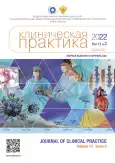Changes in the intestinal microbiota as a predictor of the development of colorectal cancer in the elderly persons: a case study
- Authors: Lagutina S.N.1, Zuikova A.A.1, Dobrynina I.S.1, Chizhkov P.A.1, Skuratova O.S.1
-
Affiliations:
- Voronezh State Medical University named after N.N. Burdenko
- Issue: Vol 13, No 3 (2022)
- Pages: 109-113
- Section: Case reports
- URL: https://journals.rcsi.science/clinpractice/article/view/110706
- DOI: https://doi.org/10.17816/clinpract110706
- ID: 110706
Cite item
Full Text
Abstract
Background: Currently, there is an increase in cancer among the elderly. Despite the obvious advances in the healthcare related to the diagnosis of the disease and its treatment, oncopathology occupies a high position in the structure of the overall morbidity. Clinical case description: Patient T., 62 years old, came to an internist with the complaints of constant pulling pains in the lower abdomen, a stool disorder in the form of alternating constipation and diarrhea, presence of blood in the stool over the past 6 months, a weight loss of 8 kg over the past 4 months. She was examined independently two years ago, when the disorders of the gastrointestinal tract appeared for the first time, which she associated with constant stressful situations at work. According to the study results, no significant deviations were found. The patient also underwent 16s-RNA sequencing of the intestinal microbiome, which revealed significant changes in many clusters of bacteria (a decrease in the quantitative composition of Lactobacterium, Bifidobacterium, Akkermansia, Faecalibacterium, which is the main representative of the normal intestinal flora, that may indicate a decrease in the protective barrier function of the colonic mucosa, an increase in Fusobacterium, as well as other representatives of the pathogenic flora). Presently, within the framework of laboratory and instrumental studies, the following diagnosis was established: "Malignant formation of the colon (colorectal cancer). T3M0N1". A repeated study of the intestinal microbiota was carried out, according to the results of which an increase in Fusobacterium up to 7.5% was observed, along with a sharp decrease in the representatives of the normoflora (<1%). Conclusion: Changes in various bacterial clusters of the intestinal microbiota can serve as an early marker for the verification of malignant neoplasms of the large intestine. Determining the amount of Fusobacterium in the intestinal microbiome can be an indicator of the first diagnostic line, which helps to identify the pathological process at the stage of precancer, take timely therapeutic measures, improve the quality of life, and increase its longevity.
Full Text
##article.viewOnOriginalSite##About the authors
Svetlana N. Lagutina
Voronezh State Medical University named after N.N. Burdenko
Email: svlagutina97@mail.ru
ORCID iD: 0000-0003-3730-5265
SPIN-code: 3165-2380
MD
Russian Federation, Studencheskaya st., 10, Voronezh, 394036Anna A. Zuikova
Voronezh State Medical University named after N.N. Burdenko
Email: zuikova-terapia23@vrngmu.ru
ORCID iD: 0000-0002-5378-4959
SPIN-code: 7605-1630
MD, PhD, Professor
Russian Federation, Studencheskaya st., 10, Voronezh, 394036Irina S. Dobrynina
Voronezh State Medical University named after N.N. Burdenko
Email: dobrynina84@mail.ru
ORCID iD: 0000-0002-4849-0200
SPIN-code: 9143-8583
MD, PhD, Associate Professor
Russian Federation, Studencheskaya st., 10, Voronezh, 394036Pavel A. Chizhkov
Voronezh State Medical University named after N.N. Burdenko
Email: qooleer@yandex.ru
ORCID iD: 0000-0002-5626-0579
SPIN-code: 5108-3444
MD
Russian Federation, Studencheskaya st., 10, Voronezh, 394036Olga S. Skuratova
Voronezh State Medical University named after N.N. Burdenko
Author for correspondence.
Email: prokopova15@mail.ru
SPIN-code: 5178-7940
MD
Russian Federation, Studencheskaya st., 10, Voronezh, 394036References
- Lin L, Zhang J. Role of intestinal microbiota and metabolites on gut homeostasis and human diseases. BMC Immunology. 2017;18(1):2. doi: 10.1186/s12865-016-0187-3
- Derovs A, Laivacuma S, Krumina A. Targeting microbiota: what do we know about it at present? Med (Kaunas). 2019;55(8):459. doi: 10.3390/medicina55080459
- Burakova I, Smirnova Y, Gryaznova M, et al. The effect of short-term consumption of lactic acid bacteria on the gut microbiota in obese people. Nutrients. 2022;14(16):3384. doi: 10.3390/nu14163384
- Chattopadhyay I, Dhar R, Petusami K, et al. Exploring the role of the gut microbiome in colon cancer. Applied Biochemistry Biotechnol. 2021;193(6):1780–1799. doi: 10.1007/s12010-021-03498-9
- Loke YL, Chew MT, Ngeow YF, et al. Colon carcinogenesis: the interplay between diet and gut microbiota. Front Cell Infect Microbiol. 2020;10:603086. doi: 10.3389/fcimb.2020.603086
- Sanchez-Alcoholado L, Ramos-Molina B, Otero A, et al. The role of the gut microbiome in colorectal cancer development and therapy response. Cancers (Basel). 2020;12(6):1406. doi: 10.3390/cancers12061406
Supplementary files






